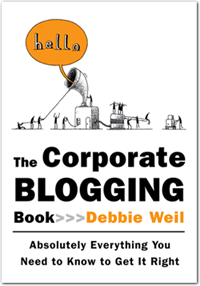Today, I spoke with Debbie Weil, who is known as the top expert when it comes to CEO blogs. She’s been very effective at positioning herself and has even wrote a book called The Corporate Blogging Book to further her brand over the past two years. Debbie is a very talented blogger and I’ve been paying close attention to her work for a while now, ever since I spotted her in the Wall Street Journal. In this interview, she goes over CEO transparency, good and bad CEO blogs, the benefits of blogging and her own personal brand.
Debbie, one of your recent blog posts talked about Marc Cuban and how transparent he was for posting about his “legal situation.” Can you explain why some CEO’s have guts like this and others don’t?
Some CEOs are great communicators, but many are not. Communicating clearly and persuasively is an essential part of their job, but too many top executives seem to have had authenticity beaten out of them. They’re media trained to the point where they only think/write in approved message points, aka corporate speak. Many are (still) imbued by a corporate culture that, typically, emphasizes caution and hewing to the party line.
So I thought it was notable that Cuban — as outspoken as he is — was willing to talk about something that was personally painful. Whether or not the charges of insider training are legitimate, it’s painful to be accused.
What are the benefits a CEO would get if they started a blog? What are the pros and cons? Should they all do it?
The pros of CEO blogging are many but there are obvious cons as well.
A few pros: opening up a direct channel of communication with stakeholders (assuming that comments from readers are allowed); putting a human face and voice on a company; the ability to reach a much wider, even global audience; the ability to communicate in real-time in times of crisis, the ability for a CEO to control his/her digital footprint (aka Google results).
Note that many public CEO blogs are avidly read by employees, so a CEO blog can effectively reach both an internal and external audience.
The cons: writing a blog (if they do it themselves) takes time and a good blog requires writing ability. That’s in woefully short supply in the executive suite. Sun Microsystems’ Jonathan Schwartz remains the most notable exception.
So the answer is no, not all CEOs should blog.
The alternatives are easy, however. If a company has a multi-author corporate blog, the CEO can jump in from time to time with a thoughtful post. Or the CEO can do a short video interview (candid, informal) and that can be posted to the company blog.
As for the argument that too many topics are “off limits,” that doesn’t hold water. Jonathan Schwartz gives “behind the scenes” notes about Sun’s quarterly earnings calls. Tesla Motors CEO Elon Musk blogged about layoffs.
Can you give 2 examples of successful CEO bloggers and 2 examples of “failures”?
Successful CEO blogs:
- Craig Newmark, CEO of Craigs List: It’s interesting, insightful and candid.
- Ross Mayfield, CEO of SocialText: Ditto.
- Bill Marriott, CEO of Marriott International: It’s not particularly revealing but I find it charming. Look, the guy is in his 70s. How cool is it that he’s blogging. I understand that he does write some (though not all) of the posts and works closely with his communications staff on topics.
- Michel Eduard Leclerc, CEO E. Leclerc: It’s in French. Let’s not forget the many corporate and CEO blogs in other languages and countries. Michel has something unique on his blog that I haven’t seen anywhere else. It’s a long alphabetical list of his “convictions” (loosely translated as passions or interests).
Less successful CEO blogs:
- John Mackey, CEO of Whole Foods: The cardinal sin: it’s rarely updated and it often doesn’t look like he’s writing it. The blog talks about John in the third person and posts transcripts of his speeches. Nothing wrong with that, per se, just don’t call it the CEO’s blog. Put that content in an online newsroom.
- Scott Neeleman, former CEO of JetBlue: The director of corporate communications wrote his blog for him. It still sounded stiff and corporate. Grade: F. I blogged about this here.
There are many direct and indirect benefits from blogging. I assume you don’t use it as a revenue machine. What benefits have you received from investing time and money in your blog over time?
If you’ll permit me to use the phrase “personal branding,” that pretty much sums up the benefit for me. I don’t think a personal brand is created over night. Once it’s created, however, you have to decide what to do with it. I haven’t leveraged my brand as much as I’d like to. I want to write another book, I’d like to do more speaking around the globe (Beijing, Shanghai, Dubai, Paris and London have been high points so far). And I’d like to use “social media for social good” even if it’s only on a local level here in Washington DC.
I remember when you were first quoted in the WSJ and LA Times in a single day last year. Was that the turning point in your career? How did it help the sales of your book, subscriptions to your blog, and speaking and consulting opportunities (building your personal brand)?
No, that wasn’t a turning point by any means. It was a nice ego boost for a day or two. But you don’t get noticed by reporters until you’ve put in the time (years) to establish yourself as an expert. My book, The Corporate Blogging Book, came out in 2006. I’ve been blogging since 2003. I wrote my first article about business blogging in 2001. The press mentions definitely help sales of my book and readership of my blog but it’s not something you can measure directly.
——–
Debbie Weil is a corporate & CEO blogging and social media consultant and sought-after speaker based in Washington DC. Her clients include Global 100 and Fortune 500 companies. he is the author of the widely praised The Corporate Blogging Book published in the U.S. by Penguin Portfolio, and also in Italian, Mandarin Chinese and a UK edition. She has written BlogWriteForCEOs, a leading blog (see #6) on social media marketing, since 2003. Debbie has parsed the implications of Web 2.0 for thousands of executives and entrepreneurs at conferences and events in the U.S., the UK, Europe and China. She has been quoted on the topic of corporate and CEO blogging in The Wall Street Journal, Fortune, Business Week, and The New York Times.







